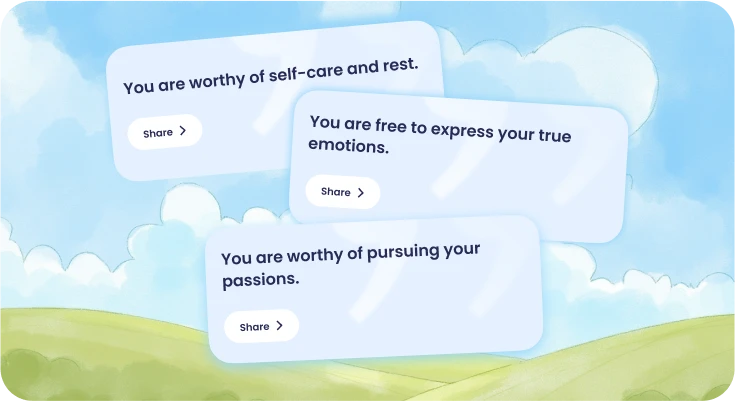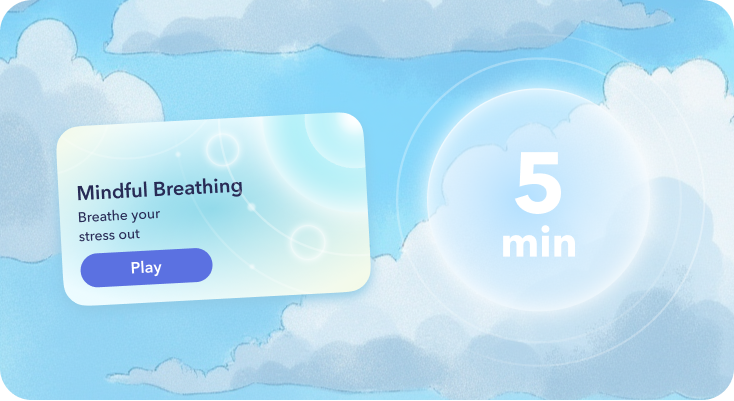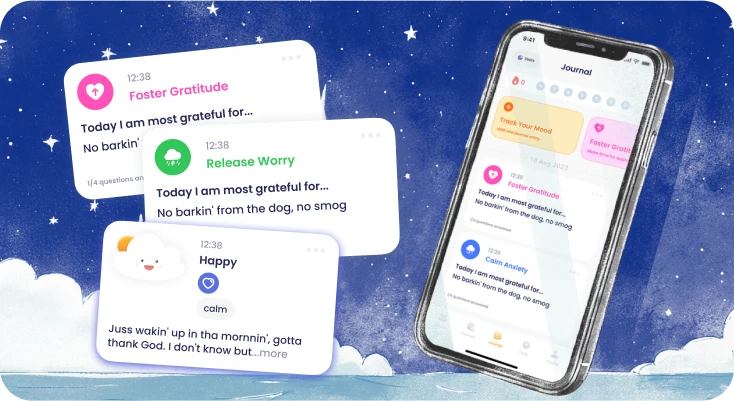Do you constantly analyze your partner’s words and actions, dwell on anxious thoughts, and spend a lot of time considering various “what ifs?”, always imagining a negative outcome? According to research by the American Psychiatric Association, overthinking makes you more vulnerable to anxiety and depression, while also being a symptom of these conditions.
So, let’s find out how to stop overthinking, live in the present moment, and build a healthy relationship.
Why Do I Overthink Relationships?
Overthinking in relationships is usually a result of deeper fears, past experiences, and unhelpful thinking patterns. Here are the most common reasons people may start feeling anxious, even in a healthy relationship:
1. There is a lack of clear communication
If you don’t express your needs openly or are uncertain about your partner’s feelings, you may fill in the gaps with assumptions, making the worst-case scenario feel like the only viable option.
2. You may have low self-esteem
If you feel worthless and not good enough for your partner, it becomes easy to assume they will eventually lose interest or find someone “better.”
3. You are a person with anxious attachment style
People with anxious attachment tend to worry about losing closeness, misinterpret neutral responses and actions as negative, and seek emotional security through constant reassurance.
4. You have negative thought patterns
Patterns like catastrophizing, mind-reading, or assuming the worst can make neutral behavior seem threatening and fuel overthinking or impulsive reactions.
5. You fear abandonment or rejection because of past trauma
If you’ve experienced cheating, dishonesty, breakups, toxic friendships, or inconsistent partners, you may constantly scan for signs that it can happen again. This may force you to overthink every detail and try to prevent betrayal.
Abusive or emotionally immature parents can also create childhood trauma that shapes your adult relationships. If your caregivers were unpredictable, dismissive, or made love feel conditional, you may have developed survival behaviors to gain control. In adulthood, this can show up as hypervigilance, expecting abandonment, or believing you must “earn” love to avoid being left.
12 Signs You’re Overthinking in a Relationship
You may pay attention to these warning signs that you’re overthinking your relationship:
1. You replay conversations with your partner in your head and reread their messages, trying to find hidden meanings or make quick assumptions.
2. You assume the worst without concrete evidence. For example, a delayed text or a short response feels like the beginning of a breakup.
3. You frequently get upset over insignificant comments and start arguments over small things that later may escalate into bigger problems.
4. You may avoid discussing your needs because you’re afraid you may sound clingy, needy, or “too much.”
5. You often apologize for things that aren’t your fault, or when there’s nothing to apologize for.
6. When your partner says they’re going somewhere, you doubt they’re telling the truth and assume betrayals or disappointments.
7. You overanalyze your partner’s mood. A small shift in tone makes you worry you did something wrong. You may believe your partner is mad at you or upset with you, even though they rarely are and have not stated so.
8. You compare yourself to your partner’s exes and get jealous, or obsess over their past relationships, wondering if they were happier before.
9. You plan everything down to the smallest detail and don’t feel comfortable being spontaneous.
10. You regularly seek assurance by asking if everything is okay or if they still love you.
11. It’s difficult for you to remain present. Even in good moments, you’re thinking about what could go wrong.
12. You often ask friends for advice about your relationship.
Understanding Overthinking and Relationship Anxiety
In short, overthinking, relationship anxiety, and attachment issues often form a cycle: insecure attachment → heightened sensitivity → relationship anxiety → overthinking → more insecurity. This is how it can look:
1. Overthinking is a symptom of insecure attachment
People with anxious attachment tend to analyze every message, tone change, or pause in communication. Overthinking becomes a way to scan for potential threats, such as rejection or abandonment.
2. Relationship anxiety fuels overthinking
Relationship anxiety makes normal situations feel unsafe. Instead of interpreting a partner’s behavior realistically, a person jumps to worst-case scenarios:
- “Did I say something wrong?”
- “Are they losing interest?”
- “What if this doesn’t work out?”
3. Overthinking activates attachment triggers
Once triggered, the mind starts spinning:
- analyzing
- predicting
- checking for signs
- assuming danger
- reacting quickly
4. Relationship anxiety is a signal of unmet emotional needs
People who overthink usually want:
- reassurance
- stability
- consistency
- emotional safety
Expert Insight
Overthinking and relationship anxiety go hand-in-hand, often impacting each other. Attachment is the foundation on which you establish and maintain interpersonal relationships, often being the underlying factor that drives overthinking and relationship anxiety.
Hannah Schlueter
Mental health professional
9 Tips on How to Stop Overthinking in a Relationship
Here’s how you can make a conscious effort to see things from a different perspective and create a healthier relationship to stop overthinking:
1. Use cognitive restructuring to break the rumination cycle
Cognitive restructuring helps replace negative thoughts with more rational ones. For example, you might think, “If I don’t get a response, it means they’re ignoring me.” Instead, try reframing it in a more objective way: “They may have their own reasons. I don’t know the full situation.”
Or, if you’re reading a message and think your partner is mad at you, offer an alternative. Maybe they were just in a hurry and sent the message too quickly? In the same way, if they’re late getting home, don’t automatically assume the worst. Ask yourself what a neutral alternative might be. Maybe they’re stuck in traffic, and their phone is dead, or they’re talking to a friend.

2. Understand your triggers and break the pattern
Do you overthink more when your partner is away from you, or when they’re talking on the phone, and you don’t know who they’re talking to? Are you feeling uncertain when it comes to written or verbal messages? Take some time to come up with a few ideas about your triggers. Then, you can start breaking them down one by one:
- Reality-check your thoughts. Ask yourself, “Do I have evidence, or is this my fear speaking?”
- Use grounding techniques. Deep breathing, counting objects in the room, or touching something cold to come back to the present moment.
Communicate your trigger. Let your partner know what situations feel difficult for you without blaming them or making assumptions.
3. Shift the focus
To break the habit of endlessly replaying obsessive analyses in your head, try to shift your focus every time your negative thoughts run their course. A licensed psychologist, Guy Winch, in his book Emotional First Aid: Healing Rejection, Guilt, Failure, and Other Everyday Hurts, recommends redirecting your attention to something that requires concentration. For example, take a 2-3 minute break by assembling a puzzle.
4. Schedule your worrying
The idea here is to prevent your intrusive thoughts from distracting you and give them a short, non-disruptive appointment. You can tell yourself, “I’ll think about this tomorrow after lunch,” put off thinking about it, and do something else. The next day, after 5-7 minutes of thinking, shift the focus from worry to action.
Ask yourself:
- What part of this worry is in my control?
- What is an actionable step I can take right now or tomorrow?
Then, regardless of whether you feel “finished,” state, “Worry time is over.”
5. Build open communication with your partner
Instead of assuming your partner “should know” what you need, articulate your thoughts and fears: “I’m a little insecure right now. Can we talk about it?” Practice active listening and ask clarifying questions instead of overthinking your relationship. For example, you may ask, “Hey, you seem a bit quiet today. Is everything okay?”
6. Work on your self-esteem
Focus on becoming the best version of yourself and challenge negative thoughts about yourself:
- Write a list of all the good qualities you possess. Keep this list somewhere visible, like on your phone, in your journal, or as a note on your desk, and read it every day.
- Try positive affirmations like:
- “I don’t need to analyze every detail. I’m safe in this moment.”
- “My thoughts are not facts.”
- “I am worthy of love without overthinking or proving anything.”
- “Not every thought requires action or attention.”
According to a study on self-affirmation, these positive statements activate parts of the brain linked to self-awareness and rewards, helping to reduce unnecessary self-doubt. You can try personalized daily affirmations in the Breeze app to manage overthinking, increase confidence, and create a more balanced perspective in your relationships.

7. Practice mindfulness to stay present
Meditation and mindfulness practices teach you to observe your thoughts without becoming emotionally involved. To learn how to live in the present moment, try the “Imagery Detachment” method. Imagine your intrusive thoughts as something external and tangible, like a cloud, a river, or a leaf floating on the water. Allow these thoughts to “float” past you without dwelling on them. This visualization helps you feel less caught up in what’s happening and separates your thoughts from yourself, so it doesn’t feel as overwhelming.
Here’s where Breeze mindful breathing may come in handy. Try beginning and ending your day with short breathing sessions, gradually lengthening them and bringing a state of mindfulness into your daily life.

8. Try stream-of-consciousness journaling
Through gradual, yet systematic, journaling, you’ll get out of your head and break free from anxiety. This method helps release mental tension, slow down racing thoughts, learn how to feel your feelings, and notice patterns you might not be aware of in the moment.
Set a timer for 5–10 minutes and write whatever comes to mind without editing or judging. You might uncover hidden fears, irrational assumptions, or emotions you didn’t realize you were carrying.
You can also combine Breeze journaling with positive affirmations and a mood tracker in the app: write your thoughts, track your mood, and pair them with affirmations to strengthen your daily self-compassion practice.

9. Use the 70/30 rule in a relationship
Spend 70% of your time together with your partner and 30% of your time apart. Time spent apart may help you focus on your own feelings, relieve stress, and gain new experiences that you can then share with your partner.
Furthermore, a recent study on social connectedness found that the quality of life is higher in those who can satisfy different emotional needs through interactions with different people. For example, a person may have a best friend who is always ready to have fun and parents who can be relied upon for support and compassion.
When to Seek Professional Help
In the early stages of a romantic relationship, thoughts about a person often intensify and bring feelings of joy and anticipation. This is part of the natural process of forming a bond and attachment.
At such times, there’s no need to suppress thoughts about a person, as they are part of the development of your feelings and the relationship. According to the 3-6-9 rule in popular psychology, at 3 months, 6 months, and 9 months, partners may feel changes in relationships and reevaluate their compatibility and core values.
However, if thoughts become intrusive, causing anxiety and interfering with your focus on life and achieving your goals, this may be a sign that it’s time to seek professional support. In this case, Cognitive Behavioral Therapy (CBT) can be particularly effective, as it allows you to identify and change negative thinking patterns, according to research on negative thinking as a depression and anxiety symptom.
Expert Insight
A great time to seek professional help when overthinking about someone you love is when you feel stuck, or when it is inhibiting your ability to succeed in daily life. A professional can help you further explore your patterns of overthinking and collaborate with you to organize your thoughts in a way that brings more clarity.
Hannah Schlueter
Mental health professional
Frequently asked questions
1. What is the 3-6-9 rule in relationships?
The 3-6-9 rule suggests that romantic relationships evolve in stages. At 3 months, 6 months, and 9 months, partners often experience shifts in emotional intimacy and commitment. These points are natural “check-ins” to reassess compatibility, communication, and shared goals.
2. What is the 70/30 rule in a relationship?
The 70/30 rule means you should aim to give about 70% of yourself to the relationship while keeping 30% for your personal growth, hobbies, and individuality. Maintaining balance in this rule means staying connected without losing your sense of self.
3. Is overthinking toxic in a relationship?
Yes, chronic overthinking can be draining for the nervous system of both partners. It often leads to insecurity, miscommunication, and unnecessary conflict. Practicing mindfulness, journaling, and open communication about your concerns can help reduce overthinking and bring a better sense of balance to a relationship.
Sources
- American Psychiatric Association. Rumination: A Cycle of Negative Thinking. March, 2020
- Guy Winch. Emotional First Aid: Healing Rejection, Guilt, Failure, and Other Everyday Hurts. July 2014
- Daphne M. Davis, PhD, and Jeffrey A. Hayes, PhD. “What are the benefits of mindfulness?” July/August 2012
- Meg Jordan. The power of connection: Self-care strategies of social wellbeing. June 2023
- Sarah J. Kertz, Jennifer Koran, Kimberly T. Stevens, Thröstur Björgvinsson. Repetitive negative thinking predicts depression and anxiety symptom improvement during brief cognitive behavioral therapy. May 2015
Disclaimer
This article is for general informative and self-discovery purposes only. It should not replace expert guidance from professionals.
Any action you take in response to the information in this article, whether directly or indirectly, is solely your responsibility and is done at your own risk. Breeze content team and its mental health experts disclaim any liability, loss, or risk, personal, professional, or otherwise, which may result from the use and/or application of any content.
Always consult your doctor or other certified health practitioner with any medical questions or concerns
Breeze articles exclusively cite trusted sources, such as academic research institutions and medical associations, including research and studies from PubMed, ResearchGate, or similar databases. Examine our subject-matter editors and editorial process to see how we verify facts and maintain the accuracy, reliability, and trustworthiness of our material.
Was this article helpful?





